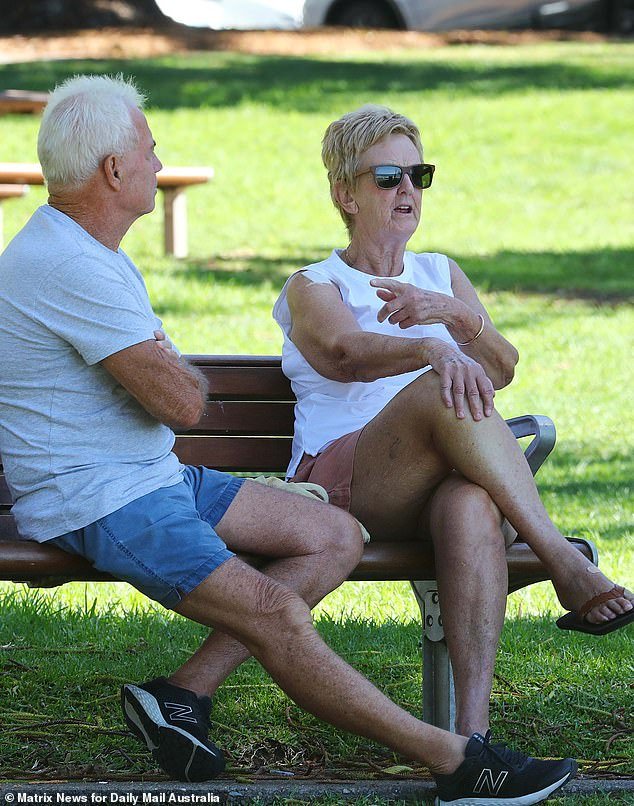A former bureaucrat who worked closely with Treasurer Jim Chalmers wants boomer retirees to be hit with a new tax on superannuation.
A 15 per cent earnings tax applies to super balances during the accumulation phase when someone is working.
But the superannuation becomes tax free when someone turns 60 and can enter the retirement phase of super, an option now available to all baby boomers.
Ken Henry, a former Treasury secretary, wants retirees to pay a new earnings tax, depriving them of that tax-free status, now available for super balances of up to $2million.
‘There are other ways of increasing the taxation that applies to high superannuation balances and improving the intergenerational equity of the superannuation system,’ he told The Conversation’s chief political correspondent Michelle Grattan.
Dr Henry said it was unfair for wealthier, older Australians to get superannuation tax breaks.
‘The thing that stands out is this big difference between the taxation of superannuation fund earnings in the so-called accumulation phase and the treatment that they get in the so-called pension phase,’ he said.
‘So, young people, again, these poor young workers, struggling and see the earnings on their accumulating superannuation balances being taxed at 15 per cent whilst those who have big superannuation balances and are in the retirement phase, well the earnings in their superannuation funds are completely tax exempt. And that just seems rather weird.’

A former bureaucrat who worked closely with Treasurer Jim Chalmers wants boomer retirees to be hit with a new tax on superannuation (pictured: boomers at Cronulla in Sydney’s south)
Dr Henry’s 2009 tax review for Kevin Rudd’s government proposed halving the superannuation earnings tax to 7.5 per cent, but applying it to both the accumulation and retirement phases of super.
‘Halving the tax on superannuation earnings to 7.5 per cent would further increase retirement savings,’ it said.
‘Applying the earnings tax to the pension phase would considerably simplify the compliance requirements of superannuation funds.
‘A structural weakness in the current retirement income system is a failure to provide products that would allow a person to manage longevity risk.’
Chalmers was former treasurer Wayne Swan’s deputy chief of staff when Dr Henry proposed taxing the retirement phase of super.
The Actuaries Institute last year proposed replacing the 15 per cent superannuation tax on earnings with a 10 or 11 per cent tax on both the accumulation and retirement earnings phases of super.
Dr Henry, however, is not campaigning against Labor’s plan to slap a new 15 per cent tax on unrealised gains on super balances above $3million.
This means super capital growth would be tax on the notional or paper value of retirement savings above this threshold before assets are sold – marking a departure from the usual capital gains tax practice of a taxing kicking in after assets are sold.

Ken Henry, a former Treasury secretary, wants retirees to pay a new earnings tax, depriving them of that tax-free status
‘I’m not opposed to it. The thing that stands out most, when you look at the way that superannuation is taxed is not that unrealised capital gains is not taxed,’ he said.
Labor needs the Greens in the Senate to pass its Better Targeted Superannuation Concessions bill.
Parliament is resuming on July 22 and the government is proposing to have its super tax plan backdated to the start of this new financial year, July 1.
The Greens want the threshold lowered from $3million to $2million but indexed for inflation.
Nick McKim, the party’s economic justice spokesman, said richer Australians needed to pay more tax.
‘Over time Australia’s superannuation system has become less about providing a dignified retirement for working people, and more of a vehicle for wealth accumulation. This needs to change,’ he said.
‘The Greens want to ensure that very wealthy Australians pay their fair share of tax, so that governments can do more to support people who need it.’
‘Obviously we have not yet seen the legislation or regulations that Dr Chalmers intends to introduce.’
A productivity-focused economic roundtable is being held in August, which will include discussions on tax policy.
Chalmers in March praised Dr Henry when asked about his observation that relying too heavily on income tax revenue was hurting young people.
‘I think the world of Ken Henry. I take his opinions very seriously. I worked with him very closely in this building, actually not that long ago and so I respect Ken and when he makes comments like that, I take them seriously and I do reflect on them,’ he told Sky News.
Super earnings have been tax free in the retirement phase since July 2007 but an indexed cap was introduced in 2017.
A spokesman for Chalmers suggested Dr Henry’s suggestion would be unlikely to become government policy.
‘Our tax policies haven’t changed. We’ve got a significant tax reform agenda that we’re rolling out,’ he told Daily Mail Australia.
‘Our focus when it comes to tax is our tax cuts for every taxpayer, improving tax compliance, ensuring multinationals pay a fairer share of tax, our changes for high balance super.’





